2013 World Pork Expo New Product Tour: Zoetis Improvest

Improvest, from Zoetis, was one of the new products at World Pork Expo that may have the potential to make the biggest impact on the U.S. pork industry, noted the new product review panel. The FDA-approved immunological castration product uses the male pig’s own immune system to temporarily create the same effect as physical castration, but much later in its life than the age when physical castration is typically performed.
Paulo Moraes, Zoetis marketing manager, says Improvest is a protein compound that works like an immunization as a safe and effective alternative to physical castration that helps manage unpleasant aromas, known as “boar taint,” emitted by intact male pigs.
“Until recently, physical castration was the only viable option to prevent off odors from developing in the meat as a result of boar taint,” Moraes explained. “Many studies and experience from around the world shows that Improvest is as effective as physical castration at managing the unpleasant aromas. Improvest is given via subcutaneous injection behind the base of the pig’s ear on two separate occasions.”
Moraes says by eliminating the need for physical castration, the pigs grow with all of the inherent advantages of intact males until the second dose of Improvest is administered. “They convert feed to meat more efficiently, meaning they eat less feed and produce less waste while creating more pork. Producers can realize increased revenue from marketing the consistently heavier pigs grown on less feed.”
“The U.S. Food and Drug Administration has determined that meat from pigs given Improvest is safe to eat,” he added. “Regulatory authorities in more than 60 countries, including the European Union, Japan, China, Russia and South Korea, have reached the same conclusions for the related global brand called Improvac, and the product has been used regularly in these countries for as long as 12 years, in some cases.”
Moraes wants producers to be aware of special safety procedures. “Special care should be taken to avoid accidental self-injection when administering Improvest to pigs, because of the potential for negative effects on reproductive physiology in both men and women,” he cautioned. “Pregnant women should not administer Improvest. Women of childbearing age, as well as men, should exercise extreme caution when administering this product. Worker safety is a priority for Zoetis. We developed a special, triple-safety syringe, along with a comprehensive training system and USDA-verified quality assurance process to support producers.”
Improvest should not be used in female pigs, barrows or male pigs intended for breeding.
Leon Sheets asked if the company had done any research surrounding consumer perceptions of the product. Moraes says extensive market research and real-life experience in Europe indicates that consumers prefer the immunological alternative to physical castration, since the social benefits outweigh the biotech concerns. “Though it is important to note that Zoetis has no plans to promote Improvest to consumers, but markets Improvest to producers and veterinarians based on the premise that it is a producer’s choice to use the technology, based on the economic benefits,” he explained.
The panel felt the product offers producers a choice when managing male pigs. Panel members felt packer willingness to accept the pigs that had been given the product would be a major factor impacting producer acceptance.
“This is a product that has a lot of valid research behind it, showing that it works, has the potential to reduce feed costs significantly, and is safe to use,” Mike Ellis said.
Learn more about Improvest at www.improvest.com.
About the Author(s)
You May Also Like



